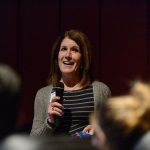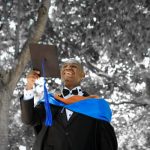“Our results show that schools, district leaders, and community groups should consider increasing their investments in summer programs as an evidence-based strategy to aid in pandemic-related educational recovery, particularly for children whose learning has been placed most at risk,” said study co-author Kathleen Lynch, an assistant professor of learning sciences at the University of Connecticut.
When Linda Pescatello began her career as an exercise science researcher, the field was a marginal part of the medical sciences. Over the course of her decades-long commitment to continual learning and research, Pescatello’s work has risen to prominence, making her an internationally recognized expert in exercise prescription and post-exercise hypotension.
Students who are both academically talented and also on the autism spectrum can enjoy greater success in college based on the correct high school experience. That’s the finding of research performed by a UConn team in the Neag School of Education and published in a recent issue of the Journal of Autism and Developmental Disorders. The study used the largest sample of academically advanced students, who also have autism, in any research study ever conducted. The authors were interested in researching a group where the focus is typically on disabilities, not talent and abilities.
Students who are both academically talented and also on the autism spectrum can enjoy greater success in college based on the correct high school experience. That’s the finding of research performed by a UConn team in the Neag School of Education and published in a recent issue of the Journal of Autism and Developmental Disorders.
When the average person consumes information through sources like television, radio, a website, or a newspaper, they might do it with a critical eye. What is the viewpoint of the news outlet? Has it been trustworthy in the past? Is there another source for this information to get a second opinion? A map is different. People tend to look at maps as absolute information that should be taken as fact without analysis. But that’s a mistake, according to a pair of UConn professors from the Neag School of Education in a recent article published in Social Studies Research and Practice.
In a newly published journal article, Neag School Professor and adult learning expert Robin Grenier examines, with colleagues including Neag School alumna Kristi Kaeppel ’20 Ph.D., the use of book clubs and literature as a tool for enhancing the professional learning of employees across various organizations — from the military to nonprofits to health care. Voluntary, fiction-based book clubs, the researchers say, offer employees a nonformal setting for learning while critically raising consciousness within an organization.
This summer, UConn neuroscientist Fumiko Hoeft, education researcher Devin Kearns, and collaborators from Psychological Sciences, the Neag School of Education, Mathematics, Brain Imaging Research Center (BIRC), and others launched the five-week, all-expenses-included summer camp at Storrs for 3rd and 4th grade children who are struggling to read.
As the world of science, technology, engineering, and math (STEM) becomes increasingly computational, promoting students’ computational thinking is essential to prepare them for future STEM careers. Neag School of Education assistant professor of learning sciences, Ido Davidesco, has received a $1.4 million grant from the National Science Foundation (NSF) to develop a month-long computational thinking unit in high school biology classes.
“I think we all suspected that we would find a relationship between the racism online in social media and student mental health,” says lead author Adam McCready, an assistant professor-in-residence with UConn’s Neag School of Education. “I think we may have been a little surprised that it was more salient, or held a stronger relationship, than in-person experiences.”
Through a collaboration with Lehigh University, Neag School of Education associate professor Jennifer Freeman will develop an intervention to improve college and career readiness for students with emotional and behavioral disorders. This $500,000 grant is sponsored by the Institute of Education Sciences (IES). Freeman is a Co-PI with Lee Kern and Chris Liang at Lehigh University.





